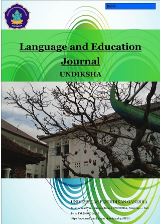Developing English Materials for Front Office of the XII Grade Students of SMK N 2 Singaraja
DOI:
https://doi.org/10.23887/leju.v4i2.33573Keywords:
D&D method, ESP, English for Front OfficeAbstract
The learning process is influenced by various factors. One of the important factors is the learning media as a supporter of the learning process, especially in learning ESP subjects. This study aimed to developed English materials for Front Office based on student’s need analyses. The subjects of this research were one teacher at SMK Negeri 2 Singaraja as the head of the front office at the school, 35 students in the second semester in class 12 AP2 of SMK Negeri 2 Singaraja, and one of the front office staff who worked at Kutabex Hotel. A questionnaire and a checklist used as the instrument to obtaining the data in this study. The method of this research used the Design and Development (D&D) model. The data has been analyzed with descriptive qualitative research. The result shows that the findings are (1) the study was developed three topics, namely: handling group guest check-in, handling group guest check out, and financial transaction based on the student’s need. (2) The design of English materials contains input, content focus, language focus, and task. In the task, the design included four English basic skills, namely: listening, speaking, reading, and writing. (3) The quality of the product belongs to very good quality based on the result of two expert judges.
References
Ahmed, S. (2017). Authentic ELT Materials in the Language Classroom : An Overview. Journal of Applied Linguistics and Language Research, 4(2), 181–202.
Asmin, A. I. (2014). A Study on English Terms Used by the Staff of Front Office Department at The Grand Clarion Hotel Makasar. Ethical Lingua, 1(2), 16–29.
Astini, K. T., Putra, I. N. A. j, & Santosa, M. H. (2018). Developing Computer-assisted Hotel Front Office English Listening Materials for Students of Tourism School in Bali. Jurnal Pendidikan Bahasa Inggris Indonesia, 6(1), 1–9. https://doi.org/10.23887/jpbi.v6i1.2701
Datu, Y., Widodo Limantoro, S., Soelistiyowati, E., Dwi Hardjanto, T., & Fuadi, Y. (2020). ESP Test for Hotel Front Office: Is It a Need? PEOPLE: International Journal of Social Sciences, 6(1), 690–704. https://doi.org/10.20319/pijss.2020.61.690704
Gagatsis, A. (2021). The Role of Pictures In Solving Verbal Division Problems And The the Role of Pictures in Solving Verbal Division Problems and the Translation. February.
Hibbard, L., & Hibbard, L. E. (2014). Ebooks : An Alternative to Paper Books for Online Students ? Ebooks : An Alternative to Paper Books for Online Students ? 8(Octuber), 46–56.
Kurniadi, N., Nitiasih, P. K., & Batan, G. (2004). Developing E-Learning English for Housekeeping Material for the Hotel Accomodation Department Students of Grade Eleven At Smkn 2 Singaraja.
Lapele, F. (2019). Need Analysis on the Material Development of Teaching Esp Speaking. ETERNAL (English, Teaching, Learning, and Research Journal), 5(2), 336. https://doi.org/10.24252/eternal.v52.2019.a13
Ndongfack, M. N. (2015). Teacher Profession Development on Technology Integration Using the Mastery of Active and Shared Learning for Techno-Pedagogy (MASLEPT) Model. Creative Education, 06(03), 295–308. https://doi.org/10.4236/ce.2015.63028
Paltridge, B., & Starfield, S. (2016). English for specific purposes. Handbook of Research in Second Language Teaching and Learning, 3, 56–67. https://doi.org/10.4324/9781315716893
Praptono, G. S. (2020). Developing English Learning Materials For Food And Beverage Service in Singaraja Hotel School. Journal of Education Technology, 4(1), 7. https://doi.org/10.23887/jet.v4i1.23524
Pridipta, K. T. D., & I Gede Budasi. (2017). An Analysis of Jargons Used By Receptionists in Front Office At Grand Istana Rama Hotel. Jurnal Pendidikan Bahasa Inggris Undiksha, 5(2), 9. https://ejournal.undiksha.ac.id/index.php/JPBI/article/view/13611
Sadiku, L. M. (2015). The Importance of Four Skills Reading, Speaking, Writing, Listening in a Lesson Hour. European Journal of Language and Literature, 1(1), 29. https://doi.org/10.26417/ejls.v1i1.p29-31
Sert, O., & Seedhouse, P. (2011). Introduction: Conversation Analysis in Applied Linguistics. 5(1), 1–14.
Supina, S. (2018). Four Basic Skills Proficiency Based on Students’ Perception in Hospitality & Tourism Study Program, Bunda Mulia University. Journal of English Language and Culture, 8(2), 128–139. https://doi.org/10.30813/jelc.v8i2.1097
Surbakti, A. H. (2002). Needs analysis in teaching learning process for developing teaching Arabic language syllabus of Islamic Religion Education of STAIS Sumatera.
Tracey, M. W. (2009). Design and development research: A model validation case. Educational Technology Research and Development, 57(4), 553–571. https://doi.org/10.1007/s11423-007-9075-0










